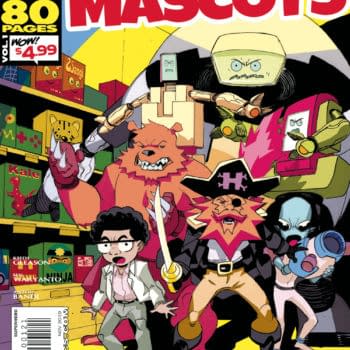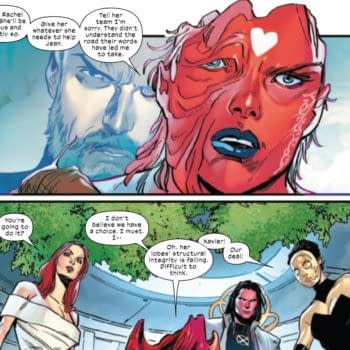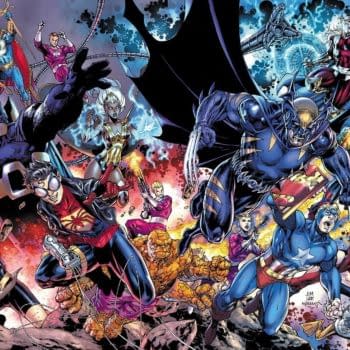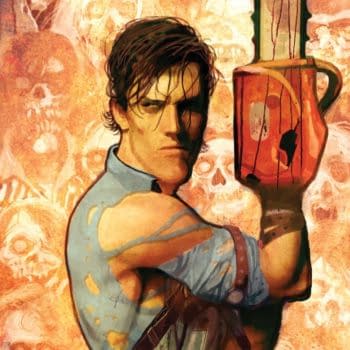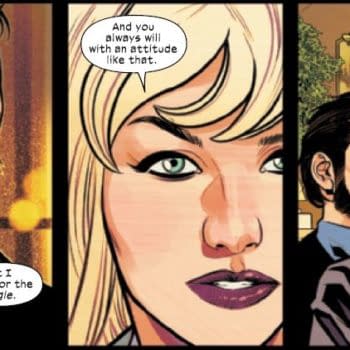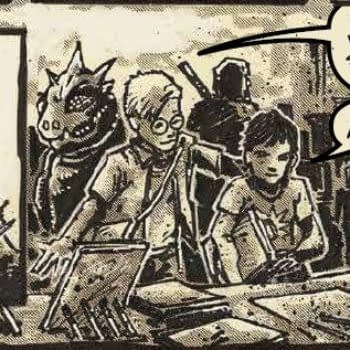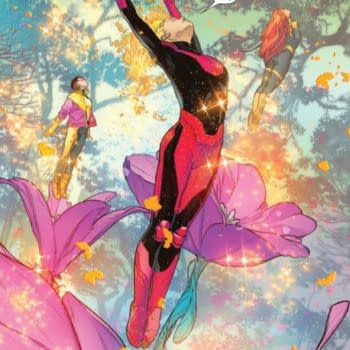Posted in: Comics | Tagged: andy lanning, boom, dan abnett, deathmatch, paul jenkins
Dan Abnett and Andy Lanning talk with Deathmatch's Paul Jenkins (Full Article)
In the pages of Bleeding Cool Magazine #1 out today, we ran an excerpt of the interview of Paul Jenkins (Wolverine: Origin, Spectacular Spider-Man) by writers Dan Abnett and Andy Lanning (Hypernaturals, Legion of Super Heroes, Guardians of the Galaxy). Jenkins reveals the details and inspiration behind creating Deathmatch for BOOM! Studios.
Following is the complete un-edited interview directly from BOOM! themselves. To see even more details on the characters, visit the DEATHMATCH DEATH DRAFT CENTRAL for character bios updated five days a week leading up to the launch of the new series.
Andy Lanning: So, where are we doing this interview from, Paul? Do you work at home or do you go off to an office?
Paul Jenkins: I live near Atlanta. So where I live, the houses tend to be pretty big. I'm lucky I've got a really nice house and the whole downstairs space is an office. I have a recording studio in one corner and my video game stuff in another. It's at the house, but it's a really good size.
Andy: Very nice. Right, so let us begin. Like you said, it'll be a bit like the blind leading the blind.
Paul: I can't wait to see how this works out. This should be funny.
Dan Abnett: We'll just have intelligent questions and answers added at a later date!
Paul: Okay. I've steeled myself.
Andy: I think where we should start is you have a new comic coming out from BOOM! Studios called DEATHMATCH. We've been teased with a little bit of information: the series is about a big group of superheroes trapped in a prison and pitted against each other in a fight to the death until only one survives. It's like the Hunger Games with superheroes! That's the one sentence pitch to the whole thing, but I'm sure you can give us a little more meat to that bone.
Paul: Yeah, I can elaborate on that a little bit. It's really interesting, because over time, I've done interviews with people and they've been really disappointed when they find out I'm not a massive fan of comics. I don't mean that to be a bad thing.
I love writing comics. I think they are a wonderful medium. I work in American comics primarily. And I'm sort of jealous that you guys get to do 2000 AD, to be honest. It's funny; I've had such a long career and never written for 2000 AD.
Andy: I'm in the same boat as you, I've never written for 2000 AD.
Paul: Oh, I thought you both had.
Dan: No, it's just me.
Paul: That's awful, Andy. That's an assumption on my part, but people have made a similar assumption about me, "Oh, you must have done 2000 AD." But the thing about 2000 AD is that you have the opportunity to create some really interesting stuff over there. And there are time here in the States, and I'm talking about primarily superhero comics, where you can and times where you cannot. Times in history almost. If you go back to the Marvel Knights days, they just handed us the keys to the castle and said, "We really don't know what to do, go ahead do whatever you want to do." And that's what made for really wonderful comics. That's the attraction.

Andy: Argh, you just ruined one my next questions…
(all three laugh)
Paul: All that stuff is really fun. I'm not massive on it, but I will say that when we were talking about doing this, I gave three of the editors at BOOM! a little task. They're really smart guys; Matt Gagnon the Editor-in-Chief, Bryce Carlson the Managing Editor, and Eric Harburn, who's the assistant editor on DEATHMATCH. It was amazing. I actually made up a bracket, like the NCAA basketball or the FA Cup, and you line up the teams and line them up until there are only two teams left.
I literally lined up the characters I'd created and put them next to each other and said to the editors, "Why don't you guys fill out a bracket. Fill out who you think is in the final." It was really funny… Even though these were characters no one knew yet, suddenly these guys are debating at work. They said they had the most fun they've had in ages just sitting around saying, "I think this guy will beat this one." It made them think of all of these story ideas.
That's the benefit of doing a story like this, you can just imagine… who would beat who and why would they beat them? Does Batman beat Superman? That's probably the most talked about question. I think Batman wins, because Batman is smart. I think Superman wins, because it's sort of no contest to begin with. And those questions are fun for fans to answer.
Now, me – I really like to get into the characters. The DEATHMATCH scenario gives you the platform to tell those cool character moments. And the final thing, I was really high on, was creating a new universe. You can see them from time to time in comics, something like Astro City that Kurt did. There weren't any rules for him to break, because he gets to say this character is in a wheelchair, and this one has this power, and once lost a fight to this character. No one can go back and argue with him. The idea of having a fresh new universe to create has been really nice.
Dan: That's something we've been having a lot of fun with in our book, HYPERNATURALS. It's exactly that, you can create everything from the ground up and there are no preconceptions, no straitjacket of continuity. Continuity can be a good thing, as well as a chain around your neck. If you are making your own continuity up, then you get to pick and choose whatever you want it to do.

Paul: That's the plan. It's as ongoing as it gets in today's comic publishing world. We want to succeed with it. BOOM! has a nice ambition as a publisher matched with a realism of how well a new series can do in today's market. The hope is that it will do really well and we'll build a nice coherent universe we can play in for a long time. It's up to the market to decide if they want it as an ongoing though.
Andy: What is the world, the background setting that gives you the ability to set up these deathmatches?
Paul: What I pitched really hard on, and they really liked, was I don't want to finish this thing where there is a winner and then we say go away. I want to create an entire world. We can look at the Marvel Universe and the DC Universe and they have their benefits, but it's occasionally driven me nuts. I've worked with editors, where we're trying to tie in the continuity of a book from 15 years ago. I asked BOOM! if we could make an entire world. So we are making like a new type of Astro City. We're going to make a world of this BOOM! universe. It is going to be populated by really interested characters that have cool powers and relationships already with each other. In the first issue, we pit two characters against each other that truly love each other, but one of them has to kill the other one. Immediately you have great character interaction and relationships that are interesting to explore. We start with a mystery too, which is how are they here and why is everyone here in this place? Why are they agreeing, once they get put in this arena; what is it that is making them actually agree to kill each other? There must be some reason and someone that is doing this to the characters. The whole thing is a big mystery.
Andy: And is that mystery you're planning on teasing out over the course of series? As a subtext or will you reveal the answer to the mystery quickly?
Paul: The mystery is our main focus. There are good guys and bad guys and those in between. The good guys are called "supes" and the bad guys are called "fears" as in "superiors" and "inferiors". It's the supes versus the fears as well as those in between – the Rorschach and Punisher-type characters. The sort of extreme types that you don't understand, that you can't read. There's one character called The Glyph, that is a symbol character. It's a magician kind of character that uses symbols, very enigmatic, and you can't read it. There's another character that's kept in the basement and no one knows what it is, it's like the monster under the bed. We have potential for all type of things.
We follow the exploits of one main character who has arrived in the Deathmatch and realizes there's no way to evade it. Everybody's there asking, "How are we here? What happened?" How do you grab Superman and put him in chains? How did they even do this to us? So right away we get into the main mystery. That is main focus of what is going on. The catch is, as they are trying to solve it, they are literally killing each other.

Dan: Because obviously, the more depth you put in, the more story potential you will get out of the world you've created. Have you found that yourself? Is that the heavy lifting of the whole process?
Paul: You guys both hit on it. That was the exact thing I was having a conversation with the editors at BOOM! about the other day. I pitched a way of telling the story that I thought was really interesting. It really revolves around bringing the world to life. We can all look at that first Batman film, the one with Michael Keaton, which I was always really fond of. That was really interesting casting by the way, you have to look at it in context of the time and go, "What?!" He did a really good job though. Anyway, I always thought Gotham City was one of the best characters in the story, right?
Andy: Yeah, absolutely.
Paul: So I was actually pitching this to them the other day, letting them know I need to add some things to the first script. I'm trying to add into it along the lines you were just saying. I'm trying to create back-stories for these characters and then show them in an interesting way. We did this to some effect a few years back in a book I did with Jae Lee – Sentry. We suggested that the Sentry had been around for a long time. That Kirby and Ditko and Rob Liefeld must have drawn him and all these different people throughout comics' history were involved, creating an artificial background. For example, and this is a big fan service thing, we introduced the idea that one of the reasons of the original Hulk series was canceled, was because the Sentry showed up in it, and we're not allowed to see that. And then we showed the old Hulk/Sentry stories and it was Hulk and Sentry versus the Lobster People. It was really fun to use those old story-telling methods to tell those stories. I think we're going to reprise that a bit in this book. I think we are going to show pivotal moments in these characters histories. Using comic book flashbacks so we can show that they've been around and had relationships with each other for a long time. It's a nice and convenient way of building the size of these characters and making the world an important character in the book.
Dan: Strangely enough to a degree, it's what we've decided to do in HYPERNATURALS. We have a six-page flashback sequence that kicks off every issue, drawn by different artists. It's a piece of an adventure, almost like an Indiana Jones-like pre-credit sequence, of another incarnation of the team showing one of their past missions. We have great ones coming up. It adds a layer to background to the characters and the world. We've also added little world-building text pieces in the back of each issue.
Paul: Oh, nice!
Andy: We're definitely ripping off Give Me Liberty and Watchmen in that respect. But also, Keith Giffen did it with his "Five Years Later" Legion of Superheroes run. He did these backmatter text pieces, which I always found fascinating and was a great way to immerse your readers.
Paul: Yeah, I'm trying to remember… that's something Alan (Moore) did with Rick Veitch too, wasn't it? What was the book they did where they had the fake Hostess Cake ads?
Andy: Yes! 1963, wasn't it.
Paul: I think so. As a kid, we'd all see the American comics in the UK with those ads in it. I remember thinking, "I don't know what a blueberry pie tastes like, but I want one. If Batman wants one, it must be good."
Andy: I always wanted a Twinkie because of those.
Paul: It was the first thing I did when I came to the States, was to find Hostess blueberry pies and have one. They're awful!
(all three laugh)
Dan: That's the last thing you ever did from a comic.
Paul: Yeah, I did it once. I'll never do that again! Anyway, I think they did fake ads and that was so much fun to pore over. That was the experience of reading those comics; it was part of it. Even those ads were interesting. Anything we do that evokes the memories of those old comics is really interesting, if we're doing it to say our world has existed for a while. That's the challenge. We're trying to point out to people that this has existed before, so they get invested in it.
Dan: There's a definite balance between trying to sell to an audience that is being shown so many comics these days to choose from. To show them a great new idea that they want to be attracted to, but convince them that it has the same sort of depth and breathing space as a comic that has been around for a long time. That has the weight of that continuity backing it up, because that's reassuring. Some thing that has been around for a long time must be good, because it has endured, right? We both seem to have had the idea that you need to not just create your world, but create your world's history in order to invite people and show them that this is pretty well worked out. You're not going to smell fresh paint everywhere you walk. These are characters with histories.
Paul: The other thing, and I wonder how you guys dealt with this challenge, because it's a fun challenge. In my world, I literally made up brackets with 32 superheroes and villains. In between killing each other until the last one is standing, the question is – why? What's happening to these people? They've already solved the mystery and they are still killing each other. But in that I wanted to make a world that had a past. The thing that is difficult, but I love, is what can we do that's different?
I want to do different not just for the sake of different; I want to do different and interesting. Maybe to illustrate this example think about how they created Daredevil, he's a guy who is really able, but has a disability. I followed that a bit with the Sentry, where he's essentially Superman but is schizophrenic. He became his own worst enemy. That was a good disability, because it built suggestions into story. I have a new character in DEATHMATCH called Dragonfly. He has this power, where he can fly between buildings, like a dragonfly flits between flowers, but for one minute at a time. So he can fly for one minute, but as he's flying if he doesn't touch something on the ground that's grounded, then he loses his power of flight and falls to his death.
Why? Because I could create a character like that. The idea of being able to create new things, is really cool. Really great. Did you guys approach it that way or go with the story first? Rather than trying to create completely new powers and so on?
Dan: No, we did. Obviously what we're doing is a cosmic book and it follows along the lines of what we did on Legion of Superheroes for DC and Guardians of the Galaxy for Marvel. Where you have a team book in a futuristic environment and all the cosmic trappings that go with that. So we definitely wanted to play with that legacy and just invent an environment where those characters could function and make it really interesting. One of the good examples would be Thinkwell, a character that can literally draw in the air and create quantum mathematical impossibilities. He's the super scientist, but he literally writes on the world around him as if it's his own blackboard. And we just came out punting with the idea of this character. So sometimes it's just a riff on a classic type of character you can play around with.
For us, the biggest thing we did, because we were inventing our own universe. We've invented a cosmic milieu, a future human society in space called the Continuum. It's not just a setting for us, but because it is free from the continuity of say the Marvel Universe and the DCU, we can tell stories in it that we couldn't tell anywhere else. That's the newness for us in this. We're presenting the types of stories we would have done for Legion or Guardians, but these aren't stories we could have done anywhere else because we would have butted up against continuity. And that freedom is where our true novelty lies.
There is, even on that micro-scale, thinking of a cool new power that you've never seen before and giving it to someone. Particularly, when you have a team book and can set characters, which are obviously new spins on classic power sets, and beside them is someone who is completely new. What are the ramifications of that going to be?
Paul: The ramifications are going to be very Spider-Man-like. It's like if I don't get home in time with this pie I'm carrying, Aunt May is going to find out I'm Spider-Man. Those are the implications of these stories, aren't they? And you thought, "I hope he gets home in time. Or she'll find out." They were exciting. That kind of simple problem of what is going to happen to this character if he doesn't make it home in time for dinner, are things that I think we miss sometimes in mainstream comics. It should be built into the character. What is going to happen? The moment you understand that as a reader I think you say, "Oh, no. I'm beginning to imagine my own stories that haven't even been told." What's going to happen if he doesn't make it? What's going to happen if he starts falling, will anyone stop him? All of these interesting things are implied. So I looked at the characters a bit like that. I couldn't give them all unique powers. This one clearly is like the Hulk. He's strong and crazy and a big beast. It's difficult to make that super unique. This other one is a Superman archtype and there's only so much you can do with that. But looking at them and trying to give them something special was vital to making the world of DEATHMATCH work. I really like the idea of Thinkwell. I'm fascinated by quantum physics and science. I actually have designs for a character that can use the rules of quantum physics in the real world. The rules normally change as it goes really small. Those types of things are really good, because they are unique.
Taking a chance on something unique isn't hard for the creators and writers, but it seems to be hard for the mainstream publishers now, doesn't it? They don't seem to want to go to that. So, I'm very grateful to be able to do it DEATHMATCH.
Andy: I think one of the slightly problematic things about the mainstream publishers right now is that they are so entrenched in what they have now, in looking at their back catalog, at their existing IP, that there doesn't seem to be any room for creating new stuff to add to that. It's very backwards looking. You can understand why they're doing that. It's just creatively, after a while, there's something to be said for creating something new. From Dan and my point of view, that's what attractive about going to BOOM! and doing HYPERNATURALS. As Dan said, we got to do the stuff we wouldn't otherwise been able to do at Marvel or DC.
Paul: Yeah, I totally feel the same way. My pitch to BOOM! was, if this works out, I'm just as happy to stay there. I've had a great career, but most of my work now is in video games and film. I'm about to direct a film here in Georgia, but I love comics. You can do amazing stories in 22 pages. I would much prefer to do this type of work, rather than try and slot in within existing continuity. I'm driven by what I create, less than a paycheck.
Being able to create new things like this, this is where I fit. If I go back and look at my time at Marvel Knights, they said, "We really don't know what to do. We've never been able to make the Inhumans succeed, so have a go at that." They let us do whatever it was we wanted to do and it was successful. I wish that always the case in the mainstream, but they fall into cycles of crossovers and events. The next thing you know it's become it's own little goblin in the direct market, but it doesn't push the boundaries. It doesn't suit me. This suits me.
Andy: It's interesting you say that about Marvel Knights, because some of our most successful stuff that we made our name with was doing the cosmic stuff at Marvel. Taking all of the "Z-list" characters that nobody had any interest in doing at the time. And it gave us creative freedom to do what we want to. No one was watching us. They basically said, "If you can make Rocket Raccoon and Groot work, then more power to you." Because they allowed us that freedom, we were able to do interesting stuff.
Paul: To you and me, that's handing us the opportunity to make good books. Giving us the freedom and space to explore characters. That's not a mystery. It's what we're supposed to do; it's our job. I've had recent experiences where I've been given complete carte blanche freedom to do a book and it came out and it was a really nice book. And everyone that read said it was wonderful. I also had another experience with a big mainstream character, where they barely printed the script that I wrote. It's astonishing to me. As creators who have a track record, we know what to do. This is how we've made our reputation. That they would want to jump in and tell us how to do it, without a record of how to get it done is astonishing.
Dan: It's that weird thing of why hire someone and then tell him or her what to do. If you are hiring someone because of their expertise, then let them get on with doing their job.
Paul: It's a bigger thing. We face it as creators all the time. What you guys did with the cosmic line was a big thing. But you were liberated to do it from the beginning. You can almost see they were like, "Okay, let's get some British creators in. They're usually clever." In you come and start writing interesting things. I'm sure you guys have been asked a million times, "Why are the Brits really smart with comics?" It's simple. We're not worried about past continuity. I'd never even heard of the Inhumans when they asked me to write them.
Giving us the freedom to create is really, really important. So coming around, I asked BOOM!, "Will I have the freedom to write this? I don't want to write silly. I don't want to just push buttons and have all the characters swear in gratuitously. I just want to write something really nice and interesting and get in depth with these characters and build them out." They seem all for it. They've been very supportive and doing this kind of book is much more my style.
Dan: Excellent. Who have you got on the art side of things with DEATHMATCH?
Paul: I've got Carlos Magno. His PLANET OF THE APES stuff has been really good. He's a fantastic artist!
Andy: He's done some work with us on the cosmic stuff. He really is fantastic, very envious because you've got a great artist.
Paul: I'm very excited. He's a real team player, very humble. He's a really hard working guy and he loves to collaborate. I love to collaborate. I'm very excited that we are going to come up with a world and it's a situation that he can really carry. Look at his artwork… he will really carry the size and the scale of these characters. The nice surprise, in just seeing the stuff that I've seen so far, he is also capable of carrying that moment when two people are sitting around and talking. One of them has to look sad and one has to look encouraging. I can say that's what I want, and I feel really comfortable that he is going to be able to carry that moment.
Andy: When you have an artist who can cover that spectrum from the action to the quiet stuff you've got to grab him and hold on to him, don't you really? Let's get down to the nitty gritty. When is Death Match coming out?
Paul: Right around Christmas. We're launching the $1 first issue the last week of December between Christmas and New Year's.
Dan: Off the back of that, how far into it are you, as far as writing is concerned?
Paul: What I did was I actually took a lot of time for doing advance prep work. In terms of writing, I'm a quick writer but a slow typist. It's awful; I never was taught how to properly type. Its embarrassing, how bad I am. I look at my keyboard and everything. I type with six fingers if I'm lucky.
Andy: Well, that's four more than me.
Paul: But I can type at the speed that I think somehow. I don't go back and fix much so it tends to be what it is. I do all the prep work very carefully so most of my work is done. All that's left to be done is break down panels and to literally write into the panels what is going on. I think very visually, I've gotten a lot of compliments from artists because when they read my script, they can see it very easily. I feel good about that because it's the end product, it's what we are trying to do. So I am into only one script at the moment, I've finished the first one but what I've also done is create the entire world, character descriptions, laid out the story as it will go, as it will come down. Now I'm beginning to type up scripts and they will come every couple of weeks from me, so we will soon be up to 4 or 5.
Andy: Where is Carlos at on the art?
Paul: He's really just starting, because he's been doing all of the character and world design.
Dan: How's that looking?
Paul: It's funny. One of them, he got so backasswards, but I said, "That's much better than my idea." We've got one character called The Cube. The Cube is based on the cuboid or box jellyfish, so it's ridiculously poisonous. It's evil. I described this character as atrocious, scruffy, blobby and all nasty. And Carlos draws this really beautiful woman with flowing jellyfish robes. I don't know where he got that from! But the design he drew for a different character named the Monkey, looked perfectly like the thing that I thought the Cube was going to look like. So I said, "See that Monkey thing? Let's make him the Cube and let's redraw the Monkey." And we'll use the female design somewhere else because it really was quite lovely.
Here's my favorite one though. I grew up on the countryside, in Dorset and Kent, on a farm in a single parent family. My dad was gone was I was five, so I spent a lot of time in the fields. I literally saw badgers, sitting in an orchard at two o'clock in the morning. Normally, you never see a European badger, you just don't see them. As a result, I'm really fond of badgers. So I described this character called Badger 54 Alpha and it was a badger who was half robot. I just wanted it to be one of the characters. To explore what happens if you just get a trained animal in this, it doesn't have a conscious to kill you or not. For some reason he drew a sort of dog. And I laughed, because badgers don't look like that, but we just rolled with it. So now he's called Dog 54 Alpha because Carlos draws a good-looking dog. So we have those types of snafus due to language. But other stuff comes in off the description and it just looks stellar. Watching Carlos' stuff come in is always a treat.
Andy: Well, we've all had problems with badgers haven't we, one way or another?
Paul: There's one of the little bastards outside my window I'm sure of it.
Andy: It's funny you should say you grew up in Kent, because I'm up in Addington and Dan's in Maidstone in Kent. I don't know whereabouts you grew up in Kent…
Paul: You know Sutton Valence?
Dan: Yeah! That's right near me. Right outside Maidstone.
Andy: See it's a small world, but I wouldn't want to paint it.
Paul: If I ever chose to go back to Britain, it'll be to Kent. It's so beautiful there. I love it.
Andy: Yeah, fantastic. Before we wrap up, I wanted to touch on your Kickstarter project as another great way of getting creative freedom. I've backed both your projects.
Paul: Thanks. Let me tell you some things I learned about Kickstarter. Some things I learned, some I expected, some I did not expect. I'll be really candid about one thing, I'm really disappointed… are you guys both on Twitter.
Dan and Andy: Yes.
Paul: I started a few months back. My business partners are always yelling at me to get more on social networking. So I started doing it and got into it to some extent. I didn't want to be the guy always touting his work, but I found it useful in doing the Kickstarter. Usually, what I like to do just put in something fun, like videos of Welsh Corgi puppies. But as you may have noticed, there've been massive fights between creators, literally just name calling and coming across very silly frankly. They get into a personal attacks about each others' work. It was silly. The point I'm making is that's the way the industry has been lately. It's not like it was ten or twelve years ago. It's not as collaborative. There seems to be less of a collective sense of "creator." That's disappointing.
I talked to a few creators though and they are collaborative and they do want to see each other succeed. And I really appreciate you backing the Kickstarter, because I want that. I want to be able to support my friends and colleagues in this industry. So Kickstarter was a real risk for Humberto Ramos and me. I have to be honest, we were really nervous. We were asking for sixty thousand dollars for that book, because it's such a high quality book. The moment we pressed "go" we were scared. It started off really quickly and then it leveled out. You looked at it and it looked like it was just barely going to hit our goal. But I rewrote the plan 15 days into it, because I got some good advice. The moment I rewrote it, the Kickstarter scaled back up again and hit ninety-five thousand, which is ridiculous. It was great. What a great model! You are basically asking your fans to invest in your publishing; they become your co-publishers. If you do it right you can bring a group of creators in. I had Jill Thompson and Steve Niles and a number of others reposting the Kickstarter link several times. I'll do the same for them for their books. I want to build the network of creators. We were criticized by some mainstream creators; claiming we're taking money from people. They think Kickstarter is a place for small people. First, that's completely inaccurate. Kickstarter themselves has said that when bigger creators come in to the site, they bring new people into the system, which benefits every Kickstarter. Secondly, why did anyone feel the need to criticize us for doing this? What was so important to someone in their day that they thought, "Jenkins and Ramos are over there doing a Kickstarter, let's make it known how I feel about that." Why would you say that? I've seen a bit of the bad from Kickstarter out of our community, but I've seen way more good. How brilliant is it that your friends and colleagues recognize you are doing something high quality, telling the story you want to? We could never make that Fairy Quest book if we were publishing in mainstream comics in the States. We can only do it by doing it ourselves, that meant printing, spot UV coating, embossing, all these things make for an expensive book. But we did it and got supported by a bunch of fans and creators. That's what we should be doing: creators backing each other up. I've done it with a number of people, retweeting their Kickstarters, I've been trying to build that kind of community, because I think it's very valuable. Don't you?
Andy: Totally. It's that idea of creating something because there's a demand for it there. You look at the successful Kickstarters and there are clearly people looking for this product that can't find it anywhere else. I think that's important. It's giving you creative freedom that you wouldn't have under any other circumstances. It's not vanity publishing, because there's a base of people who are after that product. This should be encouraged. There is more to comic books than just what you see on the spinner racks.
Paul: There's another little one that we do called Sidekick. It's the book that whenever I talk to my mate Chris Moreno about it, it makes me smile. Now, all that book has ever done is cost me money. I've never been paid a penny to write it. I'm in the hole, but it needs to exist. Anyone that sees Sidekick writes to me and laughs. It's goofy fun, the Benny Hill of superheroes. The best testament for it was the first year it came out. I was at San Diego with Chris and I went to the bathroom. I was walking in and I hear the words of the comic. Two teenagers were quoting it like it was Spinal Tap. It just needs to exist. We're not going to make a million dollars on Sidekick, but through Kickstarter we have the opportunity to publish it. If it hadn't been funded, we wouldn't have been able to make it. I love it.
Are you guys planning on doing a Kickstarter?
Andy: Well, you have to have an American address at the moment, but they are talking about rolling it out to Europe. We'd definitely be interested in looking at it down the line.
Dan: Yeah, definitely.
Paul: I'm so excited about Kickstarter, if you logistically want to do it and need an American address you can use mine. I'll happily create it for you.
Andy: That's brilliant. We'll want to explore that at some point because we're having so much fun doing the creator-owned stuff with BOOM! That creative freedom is something Kickstarter fosters.
Paul: As a warning, it's a pain in the butt too! The levels can be difficult to manage. It's amazing. Even though some fans just want the goodies, others just want to help. I love it. I think Kickstarter and more creatively freeing work like DEATHMATCH will be a big part of my future in comics.





